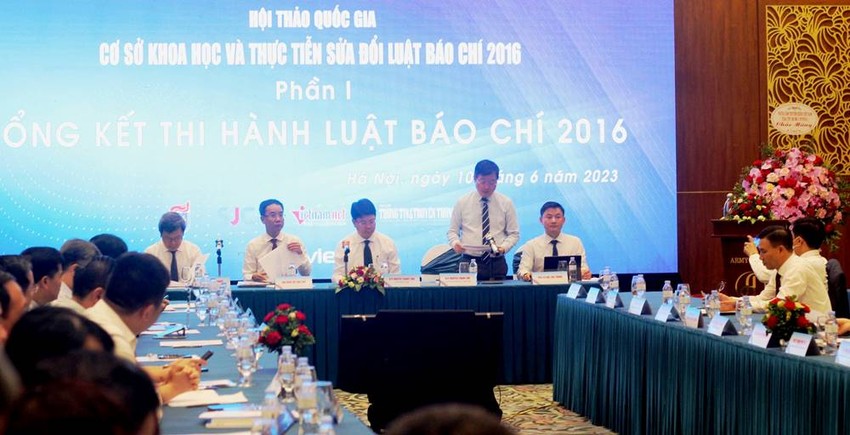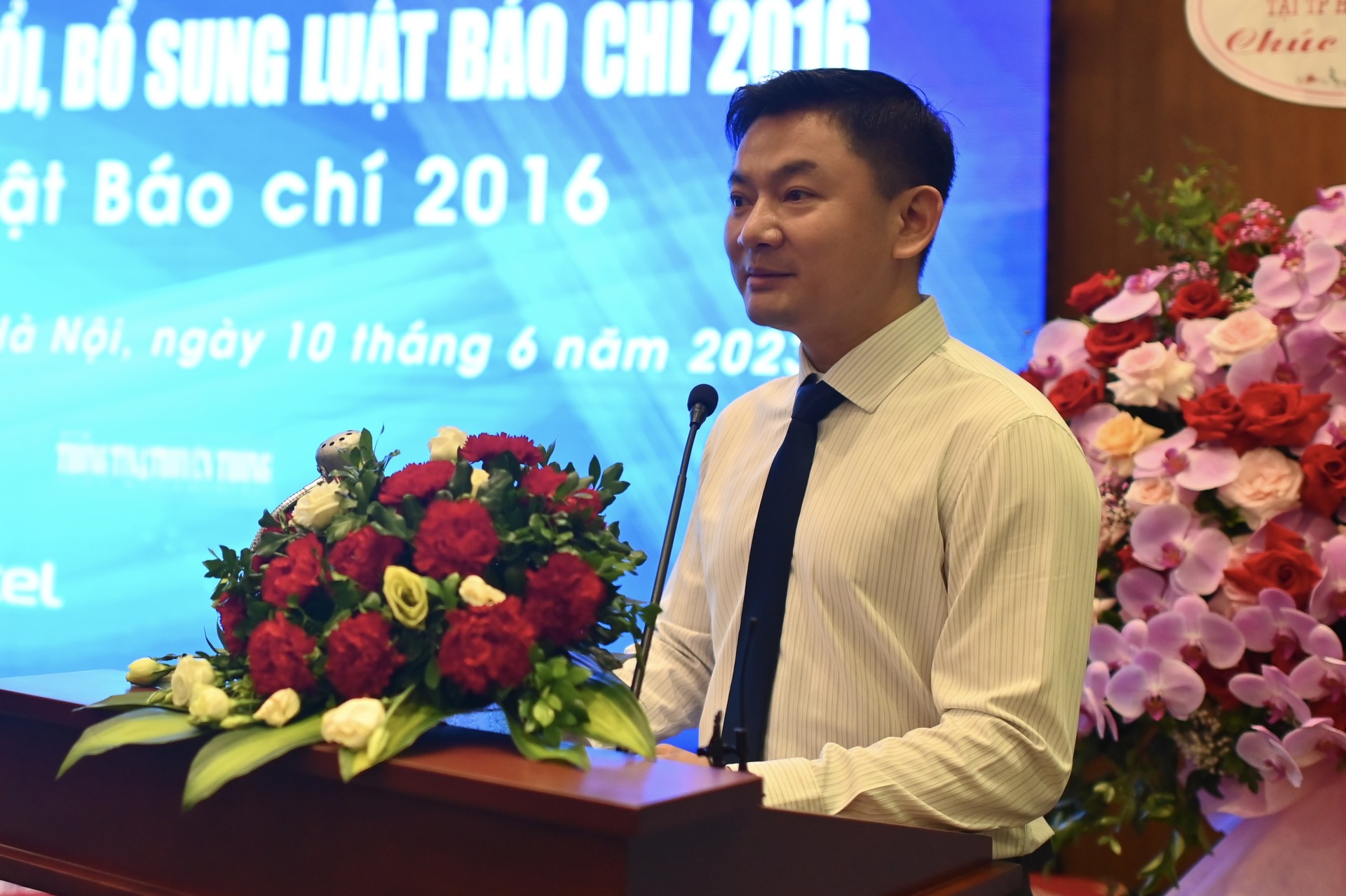Ho Chi Minh City Law Newspaperhad an interview with Associate Professor Dr. Bui Chi Trung, Deputy Director of the Institute of Journalism and Communication Training, University of Social Sciences and Humanities, Vietnam National University, Hanoi, a permanent member of the workshop's executive board, to better understand the need to amend the Press Law and some issues that need to be raised in this amendment.
Creating a corridor for journalism to develop in the digital age
Reporter:Sir, at the time of its promulgation, the 2016 Press Law was considered to have created the necessary conditions for press development. What is your assessment of this assessment?
Assoc.Prof.Dr. Bui Chi Trung:It can be affirmed that from the 1989 Press Law to the amendments and supplements in 1999, the guidance in 2002 and continued improvement in the 2016 Press Law, there have been positive changes step by step in the issue of press operation regulations. In addition to the provisions creating conditions for press development, the law also regulates and covers the contents and areas of expression of the press within the framework of Vietnamese law and constitution.
However, after seven years of establishment and operation, facing the socio-political situation with many major changes under the impact of globalization, industrialization and international integration with many new types of press and media, the issue of supplementing and amending the Press Law 2016 has become urgent and needs to be considered and adjusted soon.
Associate Professor, Dr. Bui Chi Trung, Deputy Director of the Institute of Journalism and Communication Training, University of Social Sciences and Humanities, Vietnam National University, Hanoi
Reporter:According to you, what are the reasons for that urgency?
Assoc.Prof.Dr. Bui Chi Trung:In my opinion, first of all, it is from the requirements in the direction and management of the press and the demands of society on the press field that are increasingly higher and more urgent. In particular, with the rapid development of science - technology, modern media leading to higher requirements and demands in the press field, it is necessary to perfect legal regulations to adjust, manage promptly, appropriately, creating a corridor for the press to develop in the digital age. And it is also not excluded that some individuals and organizations have sought to take advantage of loopholes to "circumvent the law" for personal gain.
Reporter:Reality shows that the 2016 Press Law has not caught up with the current trend of many types of mass media activities of a journalistic nature. What do you think about this?
Assoc.Prof.Dr. Bui Chi Trung:That's right. The 2016 Press Law currently only stipulates four basic types of journalism (print, radio, television, and electronic newspapers), but in reality there are many types of mass media activities that are similar to journalism or related to and have a profound impact on journalism activities (such as social networks, electronic information pages, domestic and cross-border applications providing information, videos, etc.).
In addition, with the trend of technology convergence, multimedia communication, multi-platform transmission (transmission on telecommunications network infrastructures such as cable, mobile, satellite television (DTH)) and especially the proliferation of broadcasting formats on the Internet environment through domestic and international websites and applications in Vietnam (OTT); these new platforms have an advantage over traditional formats in allowing interaction with readers, listeners, and viewers at the time of actual broadcast.
Reporter:In the "borderless" Internet environment, are there new trends that pose many problems for press management?
Assoc.Prof.Dr. Bui Chi Trung:Yes, in reality, there are cases where press agencies proactively build applications (apps), self-distribute content on the Internet or open additional channels to distribute press content on domestic and cross-border social networking platforms (open channels on Youtube, TikTok, open fanpages on Facebook, Lotus, Zalo...).
During operations, there are cases of errors or disputes, violations on cross-border platforms that do not comply with Vietnamese law. The development of technology is constantly moving, it will be difficult for any legal corridor to fully cover it for a long time.
Need to soon supplement regulations on new press economic model
Reporter:Press economics is also an issue that many press agencies have to pay attention to and face. In your opinion, how should this issue be raised when amending the Press Law?
Assoc.Prof.Dr. Bui Chi Trung:In my opinion, in the regulations related to the issue of press economics, it is necessary to first redefine more clearly the characteristics and functions of a number of press agencies in relation to the governing body. Clause 1, Article 21 of the 2016 Press Law stipulates: "Press agencies operate in the form of revenue-generating public service units."
Accordingly, press agencies are units belonging to state agencies, political organizations, and socio-political organizations that are public service units. Journals of social organizations, socio-professional organizations, and research institutes (not belonging to state agencies, political organizations, or socio-political organizations) are not public service units. Thus, in essence, these are press agencies with a financial planning mechanism according to the enterprise, so there should be separate regulations on the type of activities for press agencies in this group.
Reporter:In our country, some press agencies have applied content fees from readers. What do you think about this solution?
Assoc.Prof.Dr. Bui Chi Trung:The issue of charging for content is emerging as a new business solution, a reasonable and trend-appropriate journalism economic model, helping newsrooms diversify their revenue sources, create attractive and quality content to maintain operations, and reinvest in high-quality products.
However, the regulations on how to collect content fees, who is allowed to collect them and how to collect them fairly need to have a clear legal basis and basis. Therefore, the law and legal regulations in the field of journalism in the current context need to soon supplement regulations and rules to promote new journalism economic models, contributing to restructuring and diversifying journalism revenue. From there, actively contribute to the development of the electronic journalism model that collects content fees, closely linked to new technological infrastructures.
Reporter:Thank you sir.
The Press Law still has many shortcomings.
At the workshop, Deputy Director of the Hanoi Department of Information and Communications Nguyen Thi Mai Huong said that in reality, journalists and reporters who come to agencies and organizations to carry out press activities, in addition to their press cards, also have a letter of introduction from the press agency. However, the use of a letter of introduction when working has not been included in the provisions of the Press Law.
In addition, according to Ms. Huong, there are some shortcomings in the operation of general information websites and licensed social networks. Specifically, general information websites are not limited in the number of sources, as long as they get an agreement to cite the source.
Meanwhile, most businesses providing general electronic information services, for their own benefit, only focus on exploiting negative news and social evils... causing the information picture on the internet to be distorted and not accurately reflect the social situation of the country. |
Press coverage of the event:
Communist Party of Vietnam Newspaper: Clarifying the scientific and practical basis for amending and supplementing the 2016 Press Law
Capital Youth Newspaper: Creating a legal corridor for press activities to develop rapidly
Vietnamnet Newspaper:Many enthusiastic opinions contribute to amending the 2016 Press Law
Labor Newspaper:Nearly 80 experts, journalists, and lawyers contribute ideas to amend the 2016 Press Law
Capital Youth Newspaper:There needs to be a special mechanism for essential press products.
Ho Chi Minh City Law Newspaper:The 2016 Press Law has 27 contents, groups of contents have inappropriate regulations.
Capital Labor Newspaper:Amending and supplementing the 2016 Press Law to suit reality is necessary.
Ho Chi Minh City Law Newspaper: Amending the Press Law: New regulations on 'press economics' needed
Construction Newspaper:Workshop on scientific basis and practice of amending the 2016 Press Law

